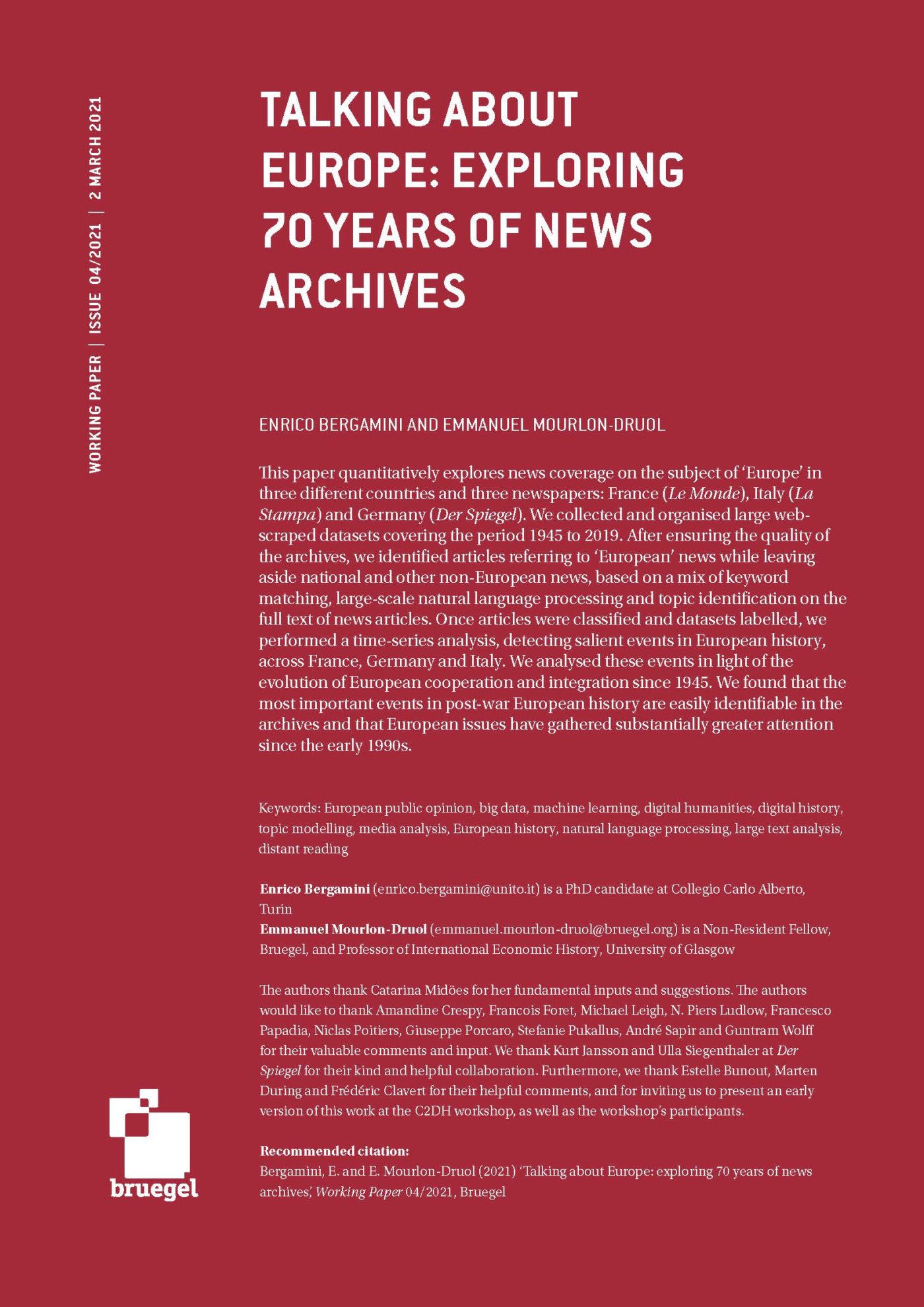Blog Post
Quo vadis, Swiss-European Union relations?
Switzerland’s decision to abandon talks on a framework agreement with the European Union will have far reaching consequences. The outline of future relations now depends both on the EU’s response and on domestic developments.
Switzerland and the European Union have a close and unique relationship, but it is a relationship that hangs in the balance after the Swiss government decided on 26 May to abandon negotiations on a so-called institutional framework agreement (InstA) with the EU. What is the agreement, why did the Swiss reject it, and where do relations go from here?
What is the institutional framework agreement?
In 1992, Swiss voters rejected European Economic Area membership. Subsequently, Switzerland and the EU created a tight web of over 120 bilateral treaties that allow for close cooperation on issues as diverse as market access, research cooperation and free movement. While close, Swiss-EU bilateral relations are therefore complicated, not least because the multiple treaties need to be updated continuously as EU law evolves. To put the relationship on a more institutionalised footing, Switzerland and the EU in 2014 started negotiations on a broader institutional framework agreement.
The institutional framework agreement’s goals were in particular to allow for easier updating of the bilateral market-access agreements and to provide a dispute settlement mechanism for any conflicts over the application and interpretation of the bilateral agreements. The objective of the institutional framework agreement was thus to consolidate and further develop the bilateral path taken by Swiss-EU relations.
Why did the Swiss side abandon the agreement?
The InstA has been contested in Swiss politics since the start of negotiations but became more politicised in 2019, when the Swiss government launched a domestic consultation on the text of the framework agreement negotiated with the EU (and which the EU at that time considered a finalised agreement). In those consultations, three issues of contention emerged: guaranteed protection for Switzerland’s traditionally high wages, state aid rules which created problems for the Swiss cantons, and the question of whether to accept the EU citizens’ rights directive (2004/38/EC) and give EU immigrants access to Swiss welfare. After further negotiations to try and resolve these issues, the Swiss government decided at the end of May that these they could not be resolved and abandoned negotiations altogether.
Critics of this decision have pointed out that these three issues weren’t insurmountable. But what made them politically problematic was that they split up the traditional pro-EU alliance in Switzerland. While the left has traditionally supported closer relations with the EU, the wage protection issue alienated trade unions who adamantly opposed the framework agreement. This new opposition emerged next to the staunch, longstanding resistance from the right who fundamentally opposed the InstA from the start (especially any role for the ECJ in the dispute settlement mechanism) as well as growing criticism from business, who have traditionally supported bilateral cooperation with the EU. Although public opinion polls have repeatedly shown a majority of voters support the InstA, the widespread criticism from both left and right made it increasingly difficult for the government to win a referendum on the framework agreement.
However, the fundamental reasons for the failure of the InstA negotiations go deeper. They are rooted in a strong Swiss unease about giving up sovereignty in a direct democracy in which voters are used to being given the final decision on issues as diverse as tax reform and the dehorning of cows, as much as on international treaties. They are also rooted in a strong preference for bilateral relations to remain as they are today. Support for the bilateral treaties is exceptionally strong in Switzerland. In a survey from February 2021, two thirds of respondents said that the bilateral treaties were very or somewhat positive, compared with only 16% who viewed them somewhat or very negatively. For many Swiss, the status quo is the ideal scenario for Swiss-EU relations.
Where are Swiss-EU relations headed?
Against this backdrop, it is not surprising that the Swiss government wants to consolidate and expand existing relations on a bilateral, case-by-case basis. The government’s immediate strategy consists of three elements: first, it will try to convince the Swiss parliament to approve the payment of the ‘cohesion billion’, money intended for cohesion measures in central Europe that was put on hold in 2019 when the EU declined to grant the stock market equivalence. Second, it will go over all areas covered by the bilateral treaties to unilaterally update and align domestic legislation with EU standards where no domestic opposition exists. Third, it plans to ‘engage in a political dialogue with the EU’.
Whether these measures will safeguard the status quo is uncertain. The EU has said that it is unwilling to update any existing agreements or conclude new ones until a framework agreement is in place. For Switzerland this is problematic because the status quo can only be maintained if both parties pursue this path. If the EU follows through on its threat of refusing to update existing agreements, then the status quo of bilateral relations will slowly erode. In the short to medium term this means new certification hurdles for the medtech and machinery industries, reduced electricity security and a relegation of Swiss researchers to third-country status in Horizon Europe. In the long run, Swiss-EU cooperation could fall far below current levels.
While proponents of the InstA in Switzerland warn against this scenario, the dominant view among Eurosceptics, and it seems the government, is that this is an empty threat. President Guy Parmelin argued in a newspaper interview that ‘the EU would damage itself by torpedoing trade relations with one of its most important trading partners’
Many believe that the EU is bluffing because it benefits equally from close relations with Switzerland. Commenting on the government’s decision, Daniel Lampart, chief economist of the Swiss trade union federation claimed ‘the EU Commission would be stupid’ to put good and regulated economic relations with Switzerland at risk. InstA sceptics also point to the 1992 experience, where despite concerns of a deterioration of Swiss-EU relations, the rejection of EEA membership ultimately resulted in a favourable and tailor-made agreement with Switzerland. Thus, there is a widespread expectation Switzerland will be able to continue on its bilateral path with the EU.
Meanwhile, the government’s decision has led to considerable domestic debate. Swiss-EU relations has turned into a cross-cutting cleavage with several key parties, most notably the liberal democrats and the social democrats, torn between a Europhile and a Eurosceptic camp. Unsurprisingly, reactions have varied widely: Views are divided on whether Switzerland should pay into EU Cohesion Funds, on the extent to which a substantial updating of domestic legislation is possible and on the merits of a new political dialogue.
More generally, there has been a range of proposals of where to go from here. Some argue that the decision to abandon negotiations was not the government’s but parliament’s prerogative. Indeed, a motion is pending in parliament urging the government to continue negotiations (the government acted before the motion could be voted on). But it is unclear whether the government’s decision could and would be overturned by parliament. Others have proposed collecting signatures for a popular initiative that would force the government to reengage with the EU. Some have gone further, arguing that Switzerland now needs a fundamental discussion about its relationship with the EU, including EU accession (an option that is deeply unpopular among Swiss voters) or EEA membership. On the conservative side of the political spectrum, there is a push for domestic reforms and more deregulation to offset the loss of EU market access with a more competitive Swiss business environment.
What future Swiss-EU relations will look like will depend both on the EU’s response and on domestic developments. A non-accommodating EU response may highlight the risks associated with an erosion of the bilateral treaties, but it may also harden feelings towards an EU that is already seen much more negatively in Switzerland than in EU countries. Domestically, new alliances may form, and the two main parties that are not represented in Switzerland’s consensus government, the Greens and the pro-EU Green Liberals, may benefit politically. But the move could also strengthen Eurosceptics, most notably the Swiss People’s Party. It will take a few months for the dust to settle and for the contours of the new Swiss-EU politics to emerge.
Recommended citation:
Walter, S. (2021) ‘Quo vadis, Swiss-European Union relations?’, Bruegel Blog, 7 June
Republishing and referencing
Bruegel considers itself a public good and takes no institutional standpoint. Anyone is free to republish and/or quote this post without prior consent. Please provide a full reference, clearly stating Bruegel and the relevant author as the source, and include a prominent hyperlink to the original post.

















